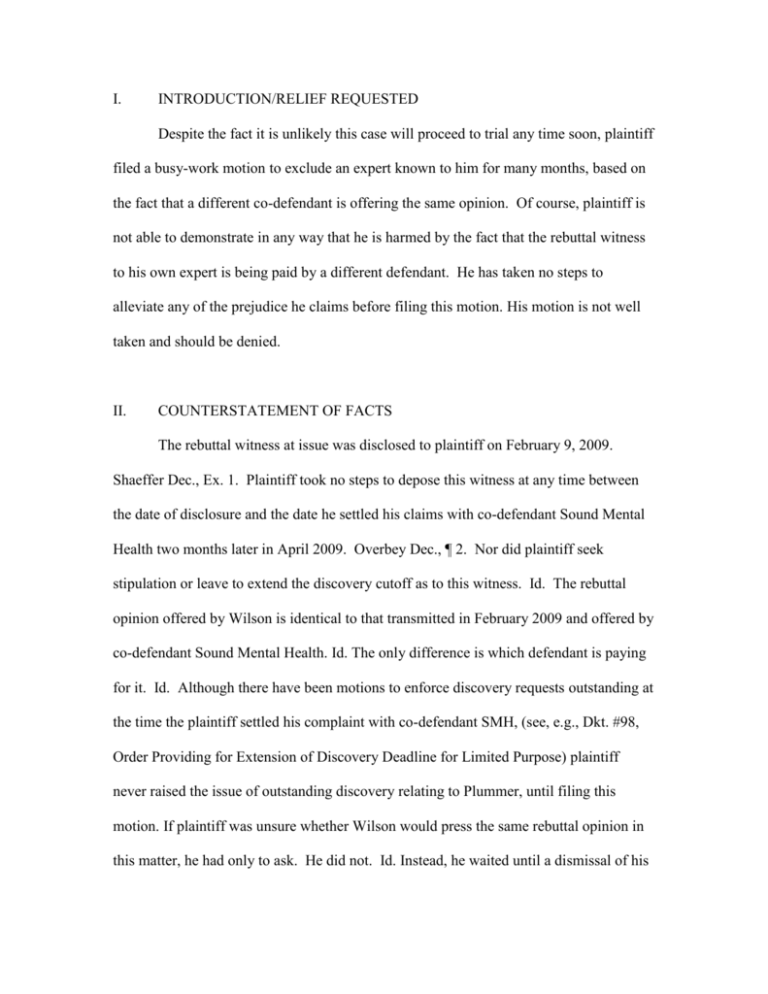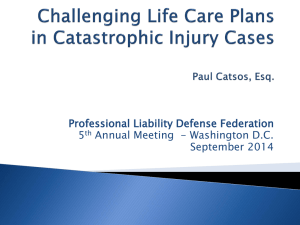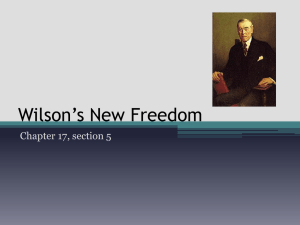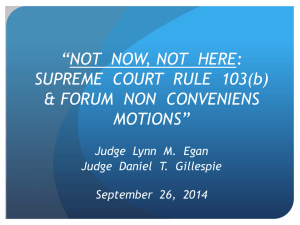Short Sample Brief
advertisement

I. INTRODUCTION/RELIEF REQUESTED Despite the fact it is unlikely this case will proceed to trial any time soon, plaintiff filed a busy-work motion to exclude an expert known to him for many months, based on the fact that a different co-defendant is offering the same opinion. Of course, plaintiff is not able to demonstrate in any way that he is harmed by the fact that the rebuttal witness to his own expert is being paid by a different defendant. He has taken no steps to alleviate any of the prejudice he claims before filing this motion. His motion is not well taken and should be denied. II. COUNTERSTATEMENT OF FACTS The rebuttal witness at issue was disclosed to plaintiff on February 9, 2009. Shaeffer Dec., Ex. 1. Plaintiff took no steps to depose this witness at any time between the date of disclosure and the date he settled his claims with co-defendant Sound Mental Health two months later in April 2009. Overbey Dec., ¶ 2. Nor did plaintiff seek stipulation or leave to extend the discovery cutoff as to this witness. Id. The rebuttal opinion offered by Wilson is identical to that transmitted in February 2009 and offered by co-defendant Sound Mental Health. Id. The only difference is which defendant is paying for it. Id. Although there have been motions to enforce discovery requests outstanding at the time the plaintiff settled his complaint with co-defendant SMH, (see, e.g., Dkt. #98, Order Providing for Extension of Discovery Deadline for Limited Purpose) plaintiff never raised the issue of outstanding discovery relating to Plummer, until filing this motion. If plaintiff was unsure whether Wilson would press the same rebuttal opinion in this matter, he had only to ask. He did not. Id. Instead, he waited until a dismissal of his claim against Wilson was looming, and filed an unnecessary motion. Defendant made plain her intent to pursue her right to qualified immunity, even before the instant motion, pursuant to FRCP 56. See Dkt. #50. (Motion for Judgment on the Pleadings). And as the defendant has already acknowledged, Ms. Wilson has the right to pursue her immunity to an appellate court before a trial. Overbey Dec., Ex. A (Hearing Transcript, Motion to Dismiss). Wilson asked plaintiff to agree to withdraw this motion, to avoid unnecessary work on this issue until it has been finally determined whether he is even entitled to a trial. Id. Ex. B. Plaintiff refused, causing Wilson to have to file responsive pleadings on his unreasonable request. Id., Ex. C. III. ARGUMENT AND AUTHORITY Wilson agrees that the operative rule, Fed.R.Civ.P. 26(a)(2)(C), provides for expert disclosure “at the times and in the sequence that the court orders”, which occurred in this case. It is undisputed that the opinion at issue was transmitted to plaintiff on February 9, 2009. Shaeffer Dec., Ex. 1. Wilson contends that the disclosure was completed, consistent with Rule 26, in February of this year. Even if plaintiff’s twisted interpretation of Rule 26 is credited, Wilson may still present the evidence. The exclusion of expert testimony is not appropriate if the failure to disclose was either substantially justified or harmless. Yeti by Molly Ltd. v. Deckers Outdoor Corp., 259 F.3d 1101, 1105-06 (9th Cir.2001). Wilson had no need to offer the Plummer opinion until recently, in response to plaintiff’s proffered expert testimony in his opposition to summary judgment. See Dkt. #136 (Gerlock Opinion). Indeed, the same Plummer opinion was offered in rebuttal to the same Gerlock opinion in February 2009. Wilson was justified in referring back to Plummer’s February opinion, in her reply brief. Even crediting plaintiff’s odd interpretation of Rule 26— that disclosure by one codefendant does not satisfy the disclosure obligations of the other codefendant on the identical opinion—he offers no proof that he is harmed by the change. Plaintiff’s reliance on Zhang v. American Gem Seafoods, Inc., 339 F.3d 1020 (9th Cir. 2003), is not well taken. That case involved failure to disclose a document that was never disclosed during discovery and offered for the first time at trial; not a document already disclosed by another party months before the discovery deadline. Plaintiff does not argue that the report of Plummer was untimely when received, but rather, that notice to him that Wilson also offers this opinion was untimely. Motion to Exclude, at 2-3. Wilson submits this is a form over substance argument that utterly fails to take into account the reality that he has had this exact opinion in his possession for approximately five months. During that time, he made no attempts to complete the discovery he now claims is lacking. Overbey Dec., ¶ 2. Even supposing plaintiff is completely taken off guard by the fact that a co-defendant would also offer the rebuttal opinion, his manufactured prejudice is easily addressed. Plaintiff could seek the discovery he claims to have relinquished due to settlement. He can do so the same way any litigant does with a third party—by subpoena. There is no real impediment to him in gaining access to information. As for a deposition he wishes to take, it is notable that he has not even asked Wilson to take this deposition or subpoenaed Plummer. Any prejudice he claims is based on speculation that he will be denied the information he has made no attempt to collect. Wilson further objects to plaintiff’s filing of a motion at a time when it is unclear whether Plummer’s opinion is even at issue. If there is no trial, the issue of whether Plummer may testify is moot. Given the fact that Wilson has the ability to seek immediate review on the issue of qualified immunity (see Lee v. Gregory, 363 F.3d 931, 932 (9th Cir. 2004)), she sought agreement to stay pretrial deadlines, including the need to respond to this motion. Overbey Dec., Ex. B. Plaintiff’s only concession was to agree that Wilson is not bound by a discovery deadline for a witness who is not currently present in the Western District. Id., Ex. C. Plaintiff’s conduct indicates an interest in creating false problems, rather than solving real ones. Before filing this claim and seeking the drastic sanction of witness exclusion, one might expect plaintiff would at least check with Wilson to see if she objects to document and deposition subpoenas related to Plummer. Instead he has created a false problem of witness disclosure, has no real basis for claimed prejudice, and ties up the time of the parties and the Court on a matter that could easily be continued to a later date, if there is ever a trial. IV. CONCLUSION It strains credibility to suggest that plaintiff is surprised by the offer of the same expert that plaintiff agrees he was notified of earlier this year, well before any discovery cutoff. His motion to exclude this witness, based on a tortured interpretation of Rule 26, should be denied. DATED this 20th day of July 2009.









